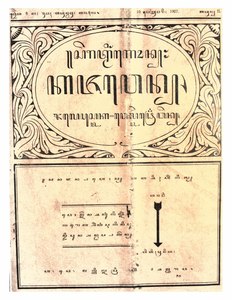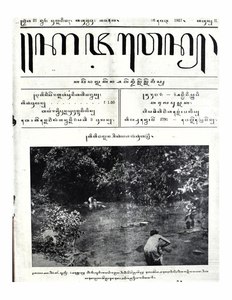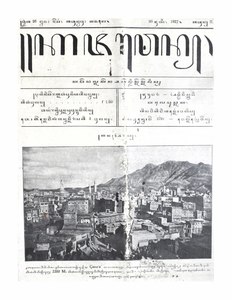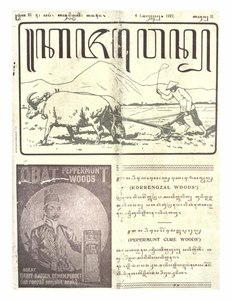GLAM/Newsletter/June 2018/Contents/Indonesia report
|
From Eastern Indonesia on Commons
Introducing open license & digitization at Dr. H.C. Oemboe Hina Kapita Museum, local museum in East Sumba
In Indonesia, The Law of Cultural Advancement No.5/2017 serves as a mandate to the government to improve public policy for the cultural sector. The law has become a tool to drive a healthy arts ecosystem, including the management of cultural institution like a museum. Therefore, this is a breakthrough to conduct file-sharing activity in a museum in Indonesia within the framework of GLAM-Wiki.
Wikimedia Indonesia in cooperation with Indonesian Arts Coalition, a cultural policy and arts advocacy organization, organized a digitization activity at Dr. H.C. Oemboe Hina Kapita Museum, Waingapu, East Nusa Tenggara. On this occasion, Wikimedia Indonesia introduced how Wikimedia Commons and Creative Commons license could be used as the medium of knowledge dissemination in their collections.
The two-day event (30–31 May 2018) was divided into presentation and digitization sessions. On the first day, Indonesia Art Coalition shared about the change of the arts ecosystem in the digital era and the importance of cultural data, as stipulated in Law on Cultural Advancement. Further, Wikimedia Indonesia explained how to use Creative Commons and various types of license. Several cultural practitioners alongside with the local government from Office of Culture and Tourism Agency and Public Library and Archive were seen to come. The proposed audience at this event was the museum staffs, therefore they could conduct a better knowledge management through the museum collections, including weft ikat, pieces of jewelry and ritual types of equipment.
- Sample collections from Dr. H.C. Oemboe Hina Kapita Museum
-
Copper bowl (top view)
-
Copper bowl (side view)
-
Ceramic bowl (top view)
-
Ceramic bowl (bottom view)
Ceramic plates, believed to be linked to the Chinese, are the type of collection that had been successfully digitized and stored on Wikimedia Commons on the second day. We had uploaded eight plates, and this amount had increased to 18 objects a week after the event took place.
For more digital collections of the museum, see Category:Images from Museum Dr. (H.C) Oemboe Hina Kapita on Wikimedia Commons.
Majalah Kajawen
Meanwhile, Wikimedia Indonesia and Yayasan Sastra Lestari, a local archive institution in Surakarta, Central Java, established a project to digitize Majalah Kajawen, a local magazine published in Indonesia. This collaboration has been started since June 2017 until now. This project aimed to preserve physical printed magazines from the archive to digital formats. The institution has already started their own effort to transliterate the magazines, which was written in Javanese characters, into Latin characters since 1997.
This project, in the first place, was to digitize all editions of Majalah Kajawen from the collection of Yayasan Sastra Lestari. They have been archiving the magazines, published from the year 1927 to 1941. The institution has been transcribing the magazines and published their work on their website, which can be accessed freely. However, according to the Chief of Yayasan, they still lack of infrastructure to digitize the magazines and keep them in the digital format. Wikimedia Indonesia, via Content Digitization project, granted a DIY book scanner to the institution, aiding them to scan and provide TIFF images of the Majalah Kajawen as the result of the scan.
Until the end of June 2018, Wikimedia Indonesia has successfully uploaded 170 numbers of Majalah Kajawen collections to Wikimedia Commons. This result can be by people, who are fond of Javanese cultures, stories, and other information in it. Several editions have been transcribed in Javanese Wikisource; some of the work can be seen here.
- Majalah Kajawen published in 1927
-
Majalah Kajawen #06, issued February 10, 1927
-
Majalah Kajawen #21, issued May 26, 1927
-
Majalah Kajawen #26, issued June 30, 1927
-
Majalah Kajawen #31, issued August 4, 1927
For a complete collection of Majalah Kajawen in Wikimedia Commons, see Category:Majalah Kajawen.
- From the team
- Armenia report
- Australia report
- Brazil report
- France report
- Germany report
- Indonesia report
- Italy report
- Macedonia report
- Netherlands report
- New Zealand report
- Russia report
- Serbia report
- Sweden report
- UK report
- USA report
- Wikidata report
- Wikimania report
- Wikimedia and Libraries User Group report
- WMF GLAM report
- Calendar









